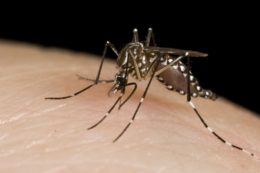![]()

The Nebraska Dept of Agriculture says a horse in the Panhandle has been confirmed with West Nile virus.
No additional information has been released on the location or disposition of the horse.
WNV is spread through the bite of an infected mosquito and can’t be transmitted directly by any other animal – including humans.
Many horses can be exposed to the disease and not show symptoms, but about 35% will become ill and potentially need to be euthanized.
Vaccines have been shown to be the best strategy to help prevent WNV infection in horses, and there are 4 WNV vaccines licensed through the USDA for use on horses.
Owners have been urged for several years to have their horses vaccinated. Anyone with an unvaccinated horse or who isn’t sure their horse has been vaccinated should contact their local veterinarian.
. If you have not vaccinated your horse or are unsure if your horse has been vaccinated, please contact your local veterinarian.
Although surveillance efforts are taking place, Panhandle residents are urged to continue protecting themselves by following these prevention tips:
- Applying mosquito repellent containing DEET, picaridin or oil of lemon eucalyptus;
- Wearing long-sleeved shirt, pants and socks;
- Avoiding going out at dawn and dusk when mosquitoes are most active;
- Eliminating standing water to reduce mosquito breeding sites
- Keep window screens in good repair, and;
- Use larvicides that contain Bacillus thuringiensis in standing water that is not easily drainable.
Horses that may be infected with West Nile virus may exhibit one or more symptoms that include:
- Weakness (hind end, front or back legs), incoordination
- Muscle twitching
- Altered mental state
- Hypersensitivity to touch or sound
- Cataplexy or narcolepsy
- Seizures
- Blindness
- Cranial nerve deficits (tongue weakness, difficulty swallowing)
- Fever
